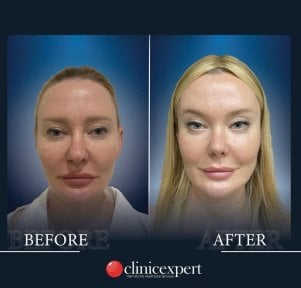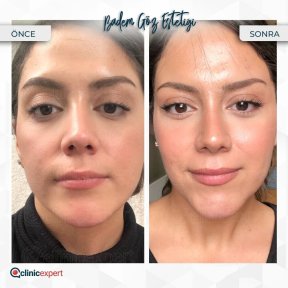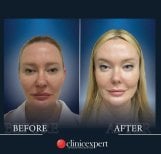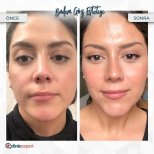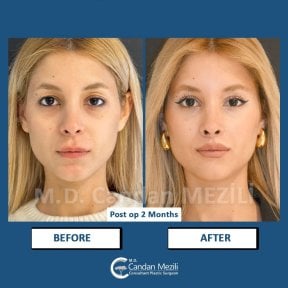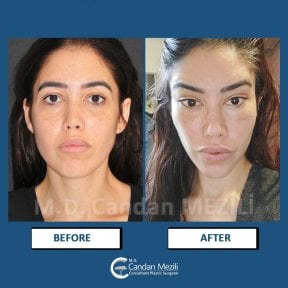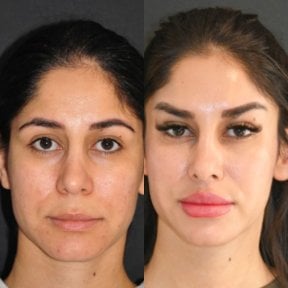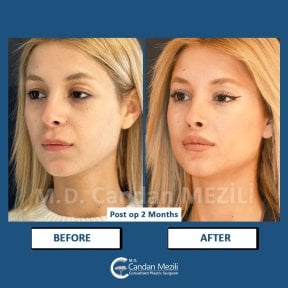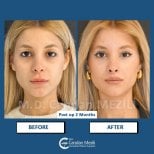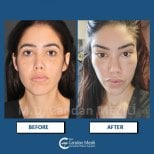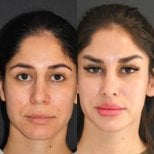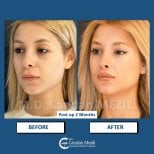This all-inclusive package features a discreet incision technique inside the eyelid crease for a scar-free lift. Dr. Murat Turker performs the 45-60 minute procedure at the award-winning CE International Hospital. The TÜV NORD CERT ISO 9001-certified clinic uses laminar-flow operating theatres for surgical safety. The package costs around $3,610, covering surgery under local anesthesia, a 4-night hotel stay, VIP Mercedes transfers, and 24/7 translator and nursing support.
How it works
How Much Does Fox Eye Lift Cost in Turkey?
The cost of a Fox Eye Lift in Turkey typically ranges from $3,600 to $4,100. Prices vary depending on the clinic, the surgeon’s expertise, and whether the lift is done surgically or with threads. In the United States, the average cost is $9,800 (per ASPS). This means Fox Eye Lift procedures in Turkey are about 60% less than in the U.S.
Most Turkish clinics include the initial consultation, pre-op blood tests, post-op medications, follow-up visits, and 24/7 patient support. Personalized treatment plans and English-speaking staff are standard. In the U.S., the listed price often covers only the surgeon’s fee, with anesthesia, medications, and follow-ups billed separately. Always confirm exactly what’s included with each clinic.
Key Benefits
- Get fox eye lift in Turkey at 60-80% less than in the USA and UK.
- Top options: PDO Thread Lift, Temporal Lift, and Canthoplasty.
- Free photo review by a doctor to find the best clinic and technique for your needs.
- 100% data protection and confidentiality guarantee.
- Exclusive deals from trusted Turkish clinics from $3,627.
| Turkey | The UK | The USA | |
| Fox Eye Lift | from $3,627 | from $6,000 | from $7,500 |
Fox Eye Lift Packages in Turkey — February 2026
This all-inclusive package, priced at about $4,100, provides transparent value for a Turkish Fox Eye Lift. Board-certified plastic surgeon Dr. Candan Mezili, who completed a rigorous 6-year specialty training at Ege University, performs the procedure at Dr. Candan Mezili's Private Practice. The fee covers the surgery, a 1-day hospital stay, a 4-star hotel, and seamless VIP airport transfers for a smooth recovery experience.
Discover the Best Fox Eye Lift Clinics in Turkey: 32 Verified Options and Prices
Lokman Hekim Istanbul Hospital
Murat Yaman
Istanbul Aesthetic Plastic Surgery Center
Gürhan Özcan
Fox Eye Lift Overview in Turkey
- Blepharoplasty (Eyelid correction) - from $1,942During an operation, eye excess skin or fat is removed to make a younger, more alert appearance.
- Upper Eyelid Surgery - from $1,890The procedure lifts droopy lids, enhancing vision and aesthetics. It involves removing excess skin, fat tissue, and muscle.
- Lower Eyelid Blepharoplasty - from $2,900This operation corrects bagginess or excess skin under the eye by removing or repositioning fat, enhancing appearance.
- Upper and Lower Eyelid Surgery - from $1,800This therapy repairs sagging skin around eyes, refreshes appearance, and can improve vision by removing excess tissue.
- Double Eyelid Operation - from $800This surgery enhances eye appearance by forming a crease, invigorating the look and improving vision.
- Droopy eyelid surgery - from $1,001This procedure corrects sagging eyelids, enhancing appearance and vision, by removing excess skin and fat.
- Hooded eyelid surgery - from $1,001This procedure corrects drooping eyelids to improve appearance, involving a skilled surgeon removing excess skin.
- Lazy eyelid surgery - from $1,800The procedure corrects droopy eyelids, resulting in improved vision and appearance with a safe and quick surgical method.
- Fox Eye Lift - from $3,627A Fox Eye Lift is a cosmetic surgery that subtly elevates the outer corners of the eyes, creating an almond-shaped appearance, with minimal recovery time required.
- Cat Eye Surgery (Canthoplasty) - from $2,200Reshaping of the outer corners of the eyes to achieve an almond-like appearance, enhancing eye symmetry and aesthetic appeal, with minimal recovery time.
- Male Almond Eye Surgery - from $2,100This cosmetic procedure reshapes the eyes to achieve a more elongated, almond-like appearance by adjusting eyelid positioning, enhancing facial harmony and symmetry.
- Bookimed deposit: $200 or €200.
- Clinic deposit: Pay a set percentage in advance.
Our Trusted Doctors
View all DoctorsMurat Yaman
Dr. Yaman performs 500-600 procedures annually, focusing on natural-looking results in aesthetic and reconstructive surgery at Lokman Hekim Istanbul Hospital.
- Trained in microsurgery at Hacettepe University
- Specializes in face lifting, nose, and ear surgeries
- Member of the Turkish Society of Reconstructive, Aesthetic, and Plastic Surgery
- Dedicated to high patient satisfaction in cosmetic procedures
Muhammet Mustafa Aydinol
Dr. Muhammet Mustafa Aydinol is a member of the International Society of Aesthetic Plastic Surgery, specializing in aesthetic procedures like the Fox Eye Lift.
- Board-certified in Plastic, Reconstructive, and Aesthetic Surgery
- Published multiple research papers on aesthetic and reconstructive techniques
- Member of Turkish Society of Aesthetic Surgeons
- Trained at Dicle University's Plastic Surgery Clinic
Aysel Pasazade
Dr. Aysel Pasazade is a plastic, reconstructive, and aesthetic surgeon. She graduated from Istanbul University Cerrahpaşa Faculty of Medicine. She completed her specialization at Bursa Uludağ University Faculty of Medicine. She holds the European Board of Plastic, Reconstructive and Aesthetic Surgery (EBOPRAS) certification.
She has worked in university hospitals and private clinics. She attends international congresses, live surgery courses, and advanced training. This keeps her practice current. She provides careful, personalized care with a focus on patient safety, function, and natural-looking results.
yunus Cinar
Dr. Yunus Cinar trained at Villa Bella Clinic in Italy under Prof. Giovanni Botti, specializing in facial aesthetics and rhinoplasty.
- Completed residency in Plastic, Reconstructive, and Aesthetic Surgery
- Participated in numerous scientific congresses on facial aesthetics
- Works at Quartz Hospital, focusing on aesthetic surgery
Video Stories from Bookimed Patients
Reviews about Bookimed: Discover Patients' Insights
All reviewsFox Eye Lift: Before & after photos
View allShare this content
FAQ about Fox Eye Lift in Turkey
How can I verify the credentials and success rates of surgeons performing Fox Eye Lifts in Turkey?
Request information on the surgeon's training, certifications, and number of procedures performed. Reputable surgeons often provide data on success rates and before-and-after photos of previous patients.
What should I do if I experience complications after returning home from Turkey?
If complications arise, contact your surgeon immediately for advice. Many clinics offer remote consultations to address post-operative issues; however, seek local medical attention if necessary.
How can I ensure that the clinic adheres to international health and safety standards?
Check if the clinic is accredited by international organizations like JCI or follows guidelines set by the ISAPS. Accreditation ensures adherence to strict health and safety protocols.
What are the non-surgical alternatives to a Fox Eye Lift, and are they available in Turkey?
Non-surgical alternatives include thread lifts, Botox, and fillers, which are available in many Turkish clinics. These options offer temporary results with less downtime compared to surgical procedures.
Can I trust online reviews and testimonials about clinics offering Fox Eye Lift in Turkey?
While online reviews can provide insights, it's important to verify them through independent sources or patient forums. Contacting past patients directly can offer more reliable feedback on their experiences.
How will follow-up care be managed once I return home after the surgery?
Follow-up care is often managed through virtual consultations via video calls. Clinics provide detailed post-operative instructions and remain available for any questions or concerns once you return home.
What should I consider when planning travel arrangements for surgery in Turkey?
Plan for at least a week-long stay to accommodate pre-surgery consultations and initial recovery. Consider booking accommodations near the clinic and ensure you have transportation arranged for follow-up visits.
Are there language barriers that could affect my understanding of the procedure or post-operative care?
Many Turkish clinics offer English-speaking coordinators and translators to assist international patients. It's important to confirm language support services before your visit to ensure clear communication.
What is the recovery process like after a Fox Eye Lift, and how long does it take?
Recovery from a Fox Eye Lift typically takes 1 to 2 weeks, with most patients resuming normal activities within this period. Expect some swelling and bruising initially, which usually subsides within 7-10 days.
Is the quality of care in Turkish clinics comparable to that in my home country?
Many Turkish clinics are accredited by international bodies like JCI, ensuring they meet global healthcare standards. Clinics often employ state-of-the-art technology and highly trained staff, making their quality of care comparable to Western countries.
How do I know if the surgeons in Turkey are qualified and experienced?
To ensure qualification, verify that the surgeon is certified by reputable organizations such as the ISAPS. Look for surgeons with extensive experience in performing Fox Eye Lifts and positive patient reviews.
What are the potential risks and complications of a Fox Eye Lift in Turkey?
Potential risks of a Fox Eye Lift include infection, scarring, asymmetry, and nerve damage. It's crucial to choose a board-certified surgeon to minimize these risks. Recovery can also involve temporary bruising and swelling.
What is the level of medicine in Turkey?
Healthcare is the key development sector of the Turkish government. The Turkish authorities are convinced that care for the citizens' health should be an absolute priority of state policy and spend about 77 billion liras for healthcare annually.
As a result, 28,000 medical facilities provide excellent medical care in the country. About 50 centers have certificate of JCI (Joint Commission International), the international improver of healthcare quality and safety across the globe. The index of certificates obtained is the largest. To compare, Israel has 20 JCI-accredited facilities, and Germany — only 10 clinics of this type.
What should you know about Turkey before the trip?
| Currency | lira (you also can pay for services in dollars and euros) |
| Best period for the trip | May-October |
| Language | Turkish (most of medical staff speaks English fluently) |
| Visa | is not required for a trip of at least 30 days per visit |
| Time difference with Europe | 3 hours |
| Time difference with the USA | 8 hours |
| Capital | Ankara |
| Medical tourism center | Istanbul |
| Popular resorts | Alanya, Antalya, Kemer, Marmaris |
What hotel services are provided here?
In Turkey, hotels of different price ranges and service levels are presented. The level of Turkish hotels is comparable to hotels in Tunisia, Morocco or Egypt. Most tourists choose 4 and 5 star hotels with all-inclusive meals. Such hotels have everything for a comfortable stay: varied food, a large well-groomed territory, animation for children and adults. Some hotels have their own water park, which guests can use for free. Budget travelers can afford to book an economical 3-star hotel with half board or no meals at all.
When is the best time to travel to Turkey?
The main advantage of Turkish resorts is the long beach season. On the Mediterranean coast, it starts in April and lasts until November. In the resorts of the Aegean Sea — from May to October. The most comfortable time for swimming is from mid-June to the end of October. A large influx of tourists is in July-August, when the air temperature is +38°C, and the water warms up to +27°C.
Do I need a visa?
In 2020, the Republic of Turkey has visa-free agreements with 89 states. Some foreigners are exempted from obtaining entry visas, others are required to receive an electronic visa (e-Visa), and still others must apply for a visa at Turkish missions abroad.
What states need a visa for treatment in Turkey and what countries can cross the border free and easy read here.
What documents are required to apply for a visa to Turkey for treatment?
Visas for travel to Turkey require a number of documents. The necessary papers can be submitted 90 days before the planned departure. Lists of documents includes:
- ID card
- confirmation of online registration and filling out the questionnaire
- certificate of income and availability of funds ($50 per day per person)
- insurance policy for a stay in Turkey (original and copy)
- 2 photos (5x6)
- visa receipt
- booking of flight and hotel
- medical opinion about the need for treatment.
